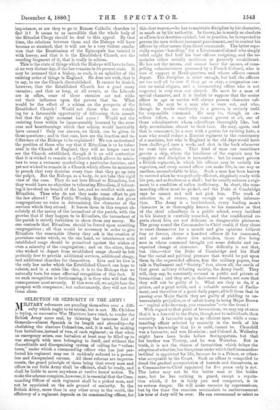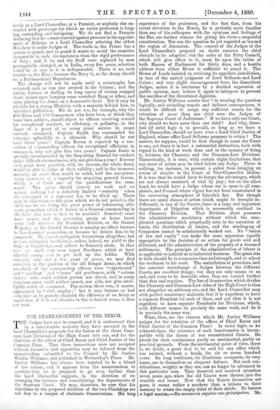SELECTION OR SENIORITY IN THE ARMY?
JILITARY reformers are puzzling themselves over a diffi-
culty which ought to be trivial, but is not. Mr. Childers is trying, as successive War Ministers have tried, to render the British Army more real, by thinning the immense List of Generals—almost Spanish in its length and absurdity—by abolishing the sinecure Colonelcies, and, it is said, by making four battalions, instead of two of each regiment ; so that when an emergency arises, one battalion at least may be filled up to war strength with men belonging to itself, and without the discreditable and disorganising system of calling for " volun- teers," under which a commanding officer who has just per- fected his regiment may see it suddenly reduced to a power- less and disorganised carcase. All these reforms are improve- mente, the grand principle of them being that every man and officer in our little Army shall be efficient, shall be ready, and shall be liable to move anywhere at twelve hours' notice. To make the scheme complete, however, it is essential that the Com- manding Officer of each regiment shall be a picked man and not be appointed on the sole ground of seniority. In the British Army, more than in any other army in the world, the efficiency of a regiment. depends on its commanding officer, for
this clear reason,—he has to maintain discipline by his character, as much as by his authority. In theory, he is nearly as absolute as aFrench or Austrian colonel ; but in practice, he is expected to govern the men without incessant punishment, and to control his officers by other means than direct commands. The latter espe- cially require handling," for a Lieutenant-Colonel who simply ruled might find half his best officers resigning, and the re- mainder either socially mutinous or passively recalcitrant. He has not the means, and cannot have the means, of com- pelling submissiveness possessed by a French Colonel, who is sure of support at Head-quarters, and whose officers cannot depart. The discipline is strict enough, but half the officers are too well off to care if they go or stay, a resignation car- ries no social stigma, and a commanding officer who is not respected is very soon not obeyed. He must be a man of special character, and it is foolish to suppose that the senior officer in age or service will always possess character suf- ficient. He may be a man who is worn out, and who, though he works excellently in a groove, is entirely unfit for responsible command. He may be, though an ex- cellent fellow, a man who cannot govern at all, one of those schoolmasters whom schoolboys thoroughly like, but defy, nevertheless, almost to their face. Ile may, again, and that is commoner, be a man with a genius for exciting hate, a man who would reduce a Russian regiment to the consistency of a machine, but who in England in the old days would have been challenged once a week, and shot in the back whenever he went into action. That kind of man can sometimes govern a ship, where the loneliness of the captain may be complete and discipline is inexorable ; but he cannot govern a British regiment, in which his officers may be socially his superiors, and every second officer can make life, in one way or another, uncomfortable to him. Such a man has been known to succeed when he was perfectly efficient, singularly ready with his pen, and as fearless as a shell ; but he usually reduces a regi- ment to a condition of sullen inefficiency. In short, the com- manding officer must be picked, and the Duke of Cambridge says he cannot and will not pick him. The work of selection is, of course, easy enough as regards informa- tion. The Army is a brotherhood, every leading man's character is as thoroughly known to his comrades as that of the chief schoolboys in a public school, every incident in his history is carefully recorded, and the confidential re- ports about him are not deficient in disagreeable plainness. The group round the Commander-in-Chief could, if they chose to exert themselves for a month and give opinions without fear or favour, choose a hundred officers fit for command, and not make above five mistakes, those five being men in whom command brought out some definite and un-
expected change of character. The difficulty is not that, but this,—that the Duke of Cambridge and his Staff fear the social and political pressure that would be put upon them by the superseded officers, fear the military papers, fear talk in Parliament and "Society," fear, above all, the cavils of that great military debating society, the Army itself. They will, they say, be constantly accused in public and private of favouritism; and they are, in their secret hearts, not sure that they will not be guilty of it. What are they to do, if a prince, and a great noble, and a valuable member of Parlia- ment, and the editor of a great daily paper, all tell them that in passing over Major Smith they are guilty of yielding to un- warrantable prejudice, or of unfair hurry to bring Major Brown —" capital aide-de-camp, you remember"—to the front With regard to that point of favouritism, we may say at once that it is a less evil to the State, though not to individuals, than seniority. A favourite may be an efficient man, while a com- manding officer selected by seniority in the teeth of his superior's knowledge that he is unfit, cannot be. Churchill was a favourite, and won Blenheim ; and Colonel A. Wellesley might have been broke before Seringapatam, but that his brother was Viceroy, and he won Waterloo. But in truth, it is not the chance of favouritism which delays the adoption of selection,but the system under which theCommander- in-Chief is appointed for life, because be is a Prince, or other- wise acceptable to the Court. Such an officer is compelled to dread the gradual accumulation of hatreds and discontents, as a Commander-in-Chief appointed for five years only is not. The latter may not be the better man or the bolder man, but he has nothing to guard, except a reputa- tion which, if he is fairly just and competent, is in no serious danger. He will make enemies by supersessions, but by the time the enmities accumulate to embarrassment his tour of duty will be over. He can recommend or select as
freely as a Lord Chancellor, or a Premier, or anybody else en- trusted with patronage for which an entire profession is long- ing, contending, and intriguing. We do not find a Premier declaring that he cannot contend against pressure in the appoint- ment of Bishops. or a Lord Chancellor selecting the oldest Benchers to make Judges of. The truth is, the Prince has a system to guard, and to guard it wants to avoid the enmities inseparable in such circumstances from the rigid performance of duty ; and if he and his Staff were replaced by men peremptorily changed, as in India, every five years, selection would be as easy as it is indispensable. There is no such trouble in the Navy, because the Navy is, as the Army should be, a Parliamentary Department.
The change will not be made until a catastrophe has occurred, such as was just averted in the Crimea ; and the nation, furious at finding its long career of victory snapped short, insists upon hanging some wretched Byng or other, and upon placing the Army on a democratic basis. But it may be possible for a strong Minister, with a majority behind him, to introduce palliatives. We do not see, for example, why the 200 Peers and 150 Commoners who have been, or think they have been soldier-3, should object to officers receiving reward for exceptional conduct, or efficiency, or gallantry, in the shape of a grant of so many years' service to count towards command. Captain Smith has commanded his company splendidly in a skirmish. Why should he not have three years ? Captain Brown is reported by a suc- cession of commanding officers for exceptional efficiency in command, why not give him two years? Captain Jones is specially recommended by the Inspecting General for conduct under difficult circumstances, why not give him a year? If every such grant were gazetted, with its reasons, the whole Army would be able to iudge of their validity ; and in the immense majority of cases they would be valid, half the exceptions being instances of a capacity for acquiring general favour, which is of itself one of the qualifications for com- mand. The grant should convey no rank and no monev. nothing but a definitely limited "seniority" when the command of a regiment has to be filled up. There may he objections to this plan which we do not perceive, the chief one we see being the great power of influencing ulti- mate promotion which it leaves to a General commanding in the field: but how is that to be avoided ? Somebody must have power, and the governing group at home know quite well whether Sir Frederick Roberts, or Sir Garnet WoLseley, or Sir Donald Stewart is naming an officer because he has deserved promotion, or because be desires him to be promoted. We cannot extinguish favouritism altogether, but we can ,1,xtinguish inefficiency, unless, indeed, we yield to the Duke of Cambritkre, and adhere to Seniority alone. In that case we shall very soon regret Purchase, which at least allowed young men to get well up the ladder. With seniority only and a few years of peace, we may find ourselves in the position of the old Bengal Army, in which one-third of the commanding officers were "experienced" and "excellent " and "brave" old gentlemen, with "serious claims," who could neither govern nor direct, and in many notorious cases could neither march, nor ride, nor give intel- ligible words of command. The system there was, of course, aggravated by "civil employ ; " but it may become so bad even here as to gravely diminish the efficiency of an Army so small that, if it is not effective in the technical sense, it does not exist.







































 Previous page
Previous page